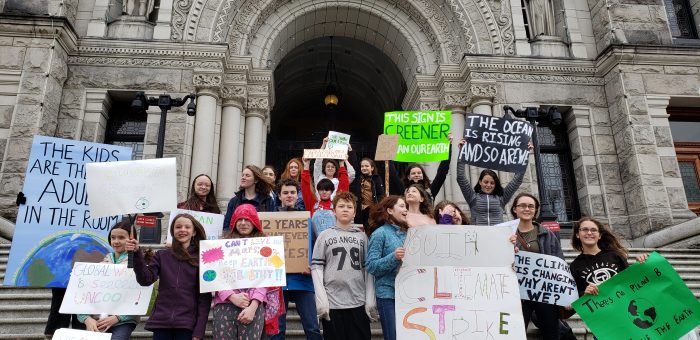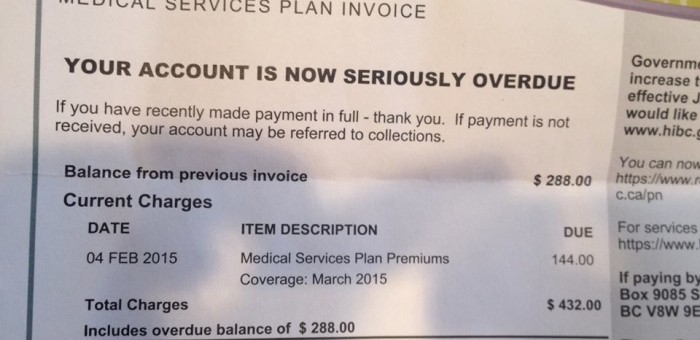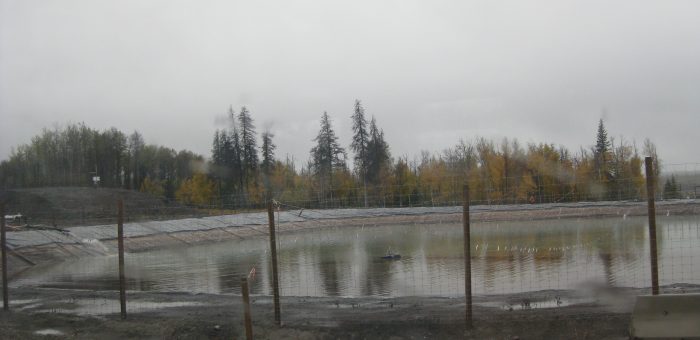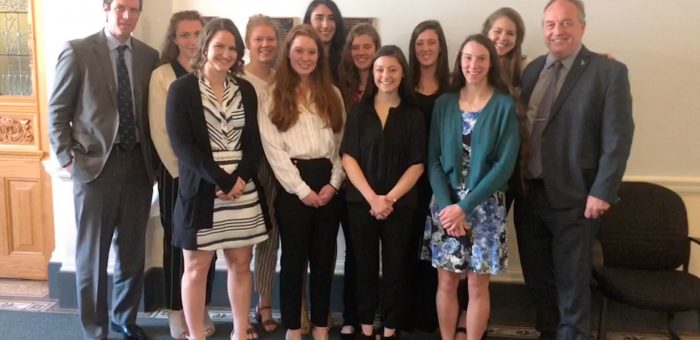Tribute to former Oak Bay Mayor Nils Jensen
In the BC Legislature today I rose to pay tribute to former Oak Bay Mayor and Councillor Nils Jensen who passed away on Sunday morning after a brief battle with cancer. Below I reproduce the text and video of this tribute.
Photo credit: Oak Bay News/Black Press.
Video of Tribute
Text of Tribute
A. Weaver: I rise today profoundly saddened by the news of the passing of Nils Jensen on Sunday, April 7, after a short battle with cancer. Nils left us far too young at the age of 69 years.
Nils made significant contributions to our community in so many ways. He served four terms on Oak Bay council, two of them as mayor. He was always driven by the best interests of his community and served us with dignity and commitment.
I was honoured to have the opportunity to get to know Nils well over these past few years. I’ve always held him in high esteem. I enjoyed his sense of humour and positive outlook on the world. I’ll sorely miss our annual lawn bowling challenge that he beat me at, year after year, as we opened Carnarvon Park’s Oak Bay Lawn Bowling Club. I’ll also miss handing out candy with him at the Oak Bay Tea Party, when every year we would run out, and we would have to borrow from him.
Nils loved Oak Bay and brought great energy to his political and community life. He also worked on critical infrastructure projects for the region during his tenure as the chair of the capital regional district and head of the regional water supply commission. Under his visionary leadership, the Sooke reservoir was raised. Nils understood that Victoria actually had a water availability crisis emerging and showed the leadership required to ensure fresh drinking water for the region was available for generations to come.
Nils was highly educated, with degrees in mechanical engineering and law degrees from Osgoode Hall in the London School of Economics. Nils had a long and distinguished career as a defence lawyer and Crown prosecutor for the province of British Columbia.
Nils leaves his wife, Jean, and two sons, Nicholas and Stewart. Our hearts go out to his family for the loss of their beloved husband and father. Our community has lost a great leader, one who has left us far too soon, and I have lost a close personal friend.
A memorial service will be held on Thursday, April 11, at 2:00 p.m. at the Oak Bay High School community theatre for Nils Jensen
BC NDP & BC Liberals reveal they’re really two sides of the same coin
Last week the BC NDP and BC Liberals joined forces to pass Bill 10, Income Tax Amendment Act, 2019. This bill created tax credits and a fiscal regime for what will become the single largest point source of carbon emissions in Canada’s history two days after a government report confirmed that Canada is warming at twice the rate as the rest of the world, with the North, the Prairies and northern British Columbia pushing to nearly three times the global rate.
The BC Greens already voted against the Bill at first reading and at second reading (where we introduced three amendments to kill the bill that were all defeated). During our numerous speeches, Adam Olsen, Sonia Furstenau and I argued that it’s time politicians level with British Columbians about the economic and environmental consequences of this historic betrayal of future generations.
During committee stage of the bill, my BC Green colleagues and I voted against each section of the bill. It was during this stage that I was also able to find out that LNG Canada has no requirement to hire locally, despite BC NDP promises to the contrary. In addition, I was able to determine that the BC NDP have a moving definition of what “cleanest LNG in the world:” actually means.
| Section 1 | Section 2 | Section 3 | Section 5 | Title |
|---|---|---|---|---|
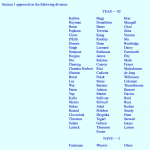 |
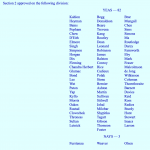 |
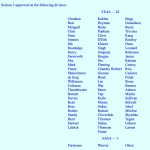 |
 |
 |
When section 4 of the bill was discussed at Committee Stage, the BC Liberals proposed an amendment that would strike out section 4b in the following:
4 The following Acts are repealed:
(a) Liquefied Natural Gas Income Tax Act, S.B.C. 2014, c. 34;
(b) Liquefied Natural Gas Project Agreements Act, S.B.C. 2015, c. 29.
That is, the BC Liberals did not want their Liquefied Natural Gas Project Agreements Act repealed.
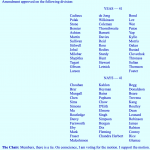 While the amendment was being debated there were a dozen or so MLAs in the chamber, and when the Assistant Deputy Speaker called for a verbal vote on the amendment the “Ayes” won. This simply means the MLAs in the chamber collectively said “Aye” louder than those saying “Nay” (I stayed silent). Given that the BC NDP lost the verbal vote, a number of them (and I) called for “Division” (a standing vote). Not interested in quibbling about how the deckchairs on the Titanic should be arranged as it starts to sink, I left the room. My colleagues Adam and Sonia were in other meetings in the building and were not present.
While the amendment was being debated there were a dozen or so MLAs in the chamber, and when the Assistant Deputy Speaker called for a verbal vote on the amendment the “Ayes” won. This simply means the MLAs in the chamber collectively said “Aye” louder than those saying “Nay” (I stayed silent). Given that the BC NDP lost the verbal vote, a number of them (and I) called for “Division” (a standing vote). Not interested in quibbling about how the deckchairs on the Titanic should be arranged as it starts to sink, I left the room. My colleagues Adam and Sonia were in other meetings in the building and were not present.
 The standing vote led to a tie: 41 BC Liberals for the amendment; 41 BC NDP against it. The 3 greens were not interested in amending a section we were about to vote against and so were not present. The tie was broken by the Assistant Deputy Speaker (a BC Liberal) and so the amendment passed, but not without controversy. The Assistant Deputy Speaker is supposed to be a non-partisan role.
The standing vote led to a tie: 41 BC Liberals for the amendment; 41 BC NDP against it. The 3 greens were not interested in amending a section we were about to vote against and so were not present. The tie was broken by the Assistant Deputy Speaker (a BC Liberal) and so the amendment passed, but not without controversy. The Assistant Deputy Speaker is supposed to be a non-partisan role.
In cases where there is a tie, there is a convention that should be followed to preserve confidence in the impartiality of the Speaker’s office. But here, the Assistant Deputy Speaker voted her “conscience” and the amendment passed. Moments later the amended section was put to a vote. Adam Sonia and I voted against that.
On Thursday last week the bill came up for third reading. Adam, Sonia and I rose to speak a final time. Sonia was shut down early by the speaker and so was unable to move an amendment to send the bill to a Legislative Committee. Adam and I both moved amendments, that Sonia spoke to, as we tried to persuade the BC NDP and BC Liberal MLAs the scale of the sellout embodied in Bill 10. Sadly, our two amendments failed and third reading passed.
| Amendment to Committee | Hoist Amendment | Third Reading |
|---|---|---|
 |
 |
 |
Below I reproduce my third reading speech as well as my speech to Adam’s hoist motion in both text and video format. I also reproduce a copy of the media release that we issued once Bill 10 passed.
Without a doubt, witnessing the BC NDP and the BC Liberal MLAs collectively vote against the three BC Greens fourteen times on this bill made it abundantly clear to me:
The BC Liberals and the BC NDP are two sides of the same neo-liberal coin.
3rd Reading Videos
| 3rd Reading & Motion to Send to Committee | Hoist Motion |
Text of 3rd Reading Speech
A. Weaver: I must say I am deeply troubled and deeply disturbed by the precedent set today in this Legislature at a time when it is quite clear from the standing orders as to the rules and regulations with respect to reading at third reading. We have been following very clearly the rules as demonstrated in the standing orders. I rise to speak to speak at third reading against this same bill.
My colleague from Cowichan Valley didn’t have the opportunity to bring forward this important information that has been brought to light during the debate, important information that is required by members of this chamber in order to make their decision, important information that reflects on the very nature of the bill-debating before us. The natural gas tax credit. The changes in the calculations that are being put forward.
It is only through a complete understanding of the complexities of the nuances in this bill, in the context of the global picture, that we are able to make an informed decision in this House. To have my colleague — to have her shut down in debate because of an interpretation that I believe is flawed is simply outrageous.
I do apologize for my comments here, but never before have I — in sitting here for six years in this chamber — seen what I believe to see: an interference of a member’s right to enter a debate on an issue subject to the standing orders that we have had guide this place for generations. I continue, as to provide the important information.
I see the House Leader for the government. They’re talking to the Speaker. I would suggest that is out of order as well in this moment here. So I continue.
Deputy Speaker: Member, the Chair would welcome any comments related, relevant, to Bill 10. So nobody is stopping anybody making those comments. I would urge the member to limit those comments just to the bill. Please carry on.
A. Weaver: These comments are to Bill 10. Bill 10, as has being articulated here, introduces three things. One, it tries to repeal the LNG Income Tax Act.
I would like to publicly note that right now, the House Leader of the government is providing advice to the Speaker in the Chair. In my view, that is outrageous. That is not something that should be happening. This is a non-partisan position. To see witness the Speaker getting advice being provided is surprising.
On to Bill 10.
Deputy Speaker: Member, please take your seat. The Chair will again urge all members who wish to speak on this bill in third reading: keep your comments relevant to the bill. That’s all we are asking for. The member wishes to continue? Please proceed.
A. Weaver: I do wish to continue, and I do apologize for challenging the decision there. But as I said, it’s troubling. I will continue on focusing solely on the bill, the number of points raised in the bill.
As I pointed out, there are three points in there. The first, of course, is the repealing of the LNG Income Tax Act. The second is the repealing of the Petronas agreement, the LNG project development agreement, which we now know — through the rather interesting amendment put forward by the opposition that has passed — will not be repealed as part of this. We enjoyed watching those deliberations and interesting to see how that moved forward.
We also know that the B.C. NDP, in this bill, are trying to retain the giveaway, the natural gas tax credit giveaway that is embedded in the original LNG Income Tax Act. We have three aspects of this bill. We have articulated in second reading time and time again….
I see in the gallery a young group of children, and I welcome them to this place. I would suggest to them, as we continue to explore this bill and the ramifications of this bill, that members in this House actually think about their future, members in the House actually recognize that this generational sellout embodied in this giveaway is not doing their future any good. Frankly, it is a betrayal of their future.
As my colleague from Cowichan Valley tried to articulate, there have been a numerous number of articles appearing that have highlighted the reason why this bill and the actual elements in it are inconsistent with the government’s goal to try to reduce greenhouse gas emissions. It is inconsistent to give away a tax credit to this industry that would not otherwise be here in British Columbia in a desperate attempt to try to deliver what Christy Clark couldn’t. That’s it. That’s the only rationale I can see behind this moving forward.
As my colleague from Saanich North and the Islands, who will speak after me, brings forward information on the bill, I would hope that members opposite, members in the B.C. Liberals, who have been saying for so long that they do not believe that this giveaway is actually fiscally responsible…. The member for Langley East was quite clear in that regard. The member from Abbotsford — not only was the member for Abbotsford West clear, his deconstructing of the job narrative that was supposed to be here was compelling. This government did not provide any information to back its claims that this agreement embodied in this bill would actually hire British Columbians.
In fact, just today I received an email from a contractor up in the north who validated the concerns I raised about Boskalis hiring temporary foreign workers. Today I received that email.
We are going to vote on a bill at third reading where information provided at the committee stage was either not provided in entirety or not delivered. We have yet to be given information. We were told in committee stage that we had to ask the Minister of Jobs, Trade and Technology questions before we get answers to the issues of how this would affect jobs. Those questions were delivered to the Finance Minister in committee stage, yet we did not get answers to those questions. How is it possible that we could actually vote in favour of bill where the answers were not forthcoming to fundamental questions raised by members of opposition and by members in the Green Party at committee stage?
It seems to me that if ever there was a reason to actually not continue forward and vote on this, if ever there was a reason to actually send this bill to committee for further deliberation and debate, that information would be the fact we didn’t get answers. It’s for that reason that I move:
[That the motion for third reading of Bill (No. 10) intituled Income Tax Amendment Act, 2019 be amended by deleting all the words after “that” and substituting therefore the following:
“Bill (No. 10) not be read a third time now but that the subject matter be referred to the Select Standing Committee on Finance and Government Services.”]
A. Weaver: The rationale for proposing that this bill be sent to committee, as put forward to you a few seconds ago, is that the information we were trying to seek at committee stage was not forthcoming.
The information about jobs, the information about where the $23 billion was going to come from, the fiscal breakdown, was not forthcoming. The information on contractors, who was going to be contracting — not forthcoming. Information on emissions and whether this initial final investment decision is actually a pathway to a four-train system — not forthcoming.
It is only through the exploration of this matter further at committee stage, it is only by bringing in expert testimony — the expert testimony from people like Katharine Hayhoe, who my colleague from Cowichan Valley tried to bring forward here…. She tried to actually bring that information to this chamber, to allow members to actually inform themselves prior to a vote.
The only means and ways that members truly will be able to actually recognize the scale of climate change, the scale of what is before us here with this bill, in terms of the generational sellout of those young children and their friends up in the gallery…. It is only through exploring this at committee stage that we will actually be able to get to the bottom of whether or not this truly is in the best interest of British Columbians.
We know that members of government’s caucus have not even been briefed on the details of this bill, and we have, as three Green MLAs, had to brief them on the details of this bill. It is sad that we have, in this chamber, so many MLAs who have not spent the time to actually go and get the information on what we’re debating before us.
That is why a committee, a legislative committee exploring this issue, bringing forward recommendations, deliberations on what is supposed to be a big project for B.C. but is, in reality, the single biggest point source of emissions that this country has ever seen, at a time that this government’s claiming it’s championing climate change policy.
This needs to go to committee, and I certainly hope members in the government will join us in supporting this, for democracy is about seeking input. It’s about making decisions based on evidence. It’s about going to the communities across British Columbia — whether it be the farmers, the farmers in the Peace, who came to us, who came to our caucus to brief us on the profound issues they have with the way the fracking is happening on their farmland, that they are considered second-class citizens.
The fact that the committee would be able to explore the views of the youth of today — the views of the youth of today who today, across this country, are getting ready for Friday. It’s another day of walkouts in schools, another day of walkouts as youth point to the political leaders and say: “You are ignoring us. You’re not going to have to live the consequences of the decisions you are making. Yet we are, and you are not including us. You are not thinking about our future in your decisions. You are thinking about your re-election. You’re thinking about what it takes to score a tick box in a ‘I did what Christy Clark couldn’t.’ And you’re doing what you think is actually the best thing that you can do based on focus groups, polling testing, etc., not doing what’s right, not doing what’s principled.”
It is sad. The saddest moment, for me, again coming back to why this should be sent to committee, is I look to what was raised when I was interviewed by CFAX this morning…. I was challenged by Al Ferraby, and I enjoy being challenged. I was challenged by Al Ferraby, who said: “What’s this about you not wishing to participate in a vote?” And we talked about that. He said: “What’s this about the member for Abbotsford West with this phrase?”
Well, I could talk about this later. But the point I’m trying to make is that I’m hoping, for the first time in the six years I’ve been here, members in government, back bench, will reflect upon these words, reflect upon those children in the gallery, as they stand up at third reading and determine the future of this bill — the future of this bill which my colleagues, numerous times over the last few days, have pointed out betrays our climate commitments, betrays future generations, provides false promises to the people in northwestern B.C., who are already seeing the temporary foreign workers coming in.
We know that the only way to actually get to the bottom of these very important questions is through committee, because we did not get the answers at committee stage. We need to send this to a standing committee.
Again, wouldn’t it be a joyous occasion if members opposite, who have criticized this deal for being fiscally irresponsible…. We agree with them. We agree with them that it’s fiscally irresponsible. If they then joined us in voting to send this to committee, to allow a committee to actually explore the level of fiscal irresponsibility embodied in this bill, to challenge the claims, give us the chance to explore with the Minister of Jobs, Trades and Technology what the real job deals are. Have there been secret sweet deals signed with certain people about bringing in temporary foreign workers?
With that, I’ll take my place and certainly hope that others will join me in supporting this amendment
Text of Speech in Support of Hoist Amendment
A. Weaver: I rise to speak very briefly in support of my colleague’s, the member for Saanich North and the Islands, hoist amendment on the bill.
My colleague, I think, has made a very, very compelling case as to why we need the additional six months’ time to reflect upon it. More so, I would suggest, members in this House, have not received the information that they need to make a decision. I’ve heard many talk about the importance of evidence-based decision-making. It’s something that’s fundamental to who we are as members of the B.C. Green caucus. I’ve heard others in this place talk about the importance of that. Yet, we know that the information, the evidence on which to make such a decision, has not been presented to us here in committee stage.
We know that this bill has three components to it. It has a component to repeal the Liquefied Natural Gas Project Agreements Act. There’s a component to repeal the LNG Income Tax Act. And there was, at the same time, a component of the bill to retain the tax credit — the corporate welfare on steroids — that existed within the LNG Income Tax Act. We know, in what has got to be described as a bizarre set of things that have happened here, that we’ve broken precedent in this place. We’ve broken historical precedent in Westminster parliamentary democracies during the course of these debates, not once, but twice during the course of these debates. That, in and of itself, I would suggest should give us pause to reflect upon this bill with the additional time that we would get through this hoist amendment.
We had an amendment put forward by the B.C. Liberals, an amendment to quibble about where the deck chairs on the Titanic should be prior to the Titanic sinking to the bottom of the ocean. We had an amendment that actually led to a tie vote — 41-41. With respect, in the long, rich tradition of Westminster parliamentary democracies, we had a precedent set that goes directly against the historic nature of this building, where a Chair votes out of conscience in a partisan manner with the opposition. This is outrageous. It’s outrageous, given that we, at the same time in the U.K., had the ruling set out why the Speaker in the U.K. ruled with government. That is the role in a Westminster parliamentary democracy of a Chair, to ensure that the debates flow forward.
That was our first precedent-setting decision. Very, very unfortunate. But that was not the only one. The second one, too, gives reason to pause as to why we need to reflect upon this bill for a few more months, because clearly, the process in this place, leaves a lot to be desired. That was my colleague from the Cowichan Valley, who spent many, many hours going through the media to determine what information was missing, in order to inform members on the decision that was going to be made today — information that was not present, not given during committee stage, information that she took upon herself to find and bring forward. She was shut down at third reading. The member was told to sit down. Her voice was silenced. Outrageous.
Two times during the course of the last 48 hours, two times we’ve had such statements. That is why it’s critical for us to reflect upon this.
With that, I’ll take my place and suggest to members opposite that this is the time for us to actually reflect upon the implications of this. I certainly hope we’re joined in voting in support of my member’s amendment.
Media Release
BC enables landmark emissions source same week report finds Canada warming at twice the global rate
For immediate release
April 4, 2019
VICTORIA, B.C. – Today, the BC NDP and BC Liberals passed into law tax credits and the fiscal regime for what will become the single largest point source of carbon emissions in Canada’s history two days after a government report confirmed Canada is warming at twice the rate as the rest of the world, with the North, the Prairies and northern British Columbia pushing to nearly three times the global rate.
“This legislation is not only lacking vision to bring BC into a competitive economic future, it is compounding the massive challenges we have before us today in the form of extreme weather events: massive fires, droughts, and flooding,” said Dr. Andrew Weaver, leader of the BC Greens and award-winning lead author of four United Nations Intergovernmental Panel on Climate Change reports. “The BC NDP and BC Liberals are together sending BC down the wrong path with new fossil fuel subsidies and the expansion of the oil and gas sector while much of the world is transitioning to a clean economy based on innovation and sustainability.
“Our caucus used every tool at our disposal to oppose this legislation. We forced 14 votes in order to give MLAs repeated opportunities to stand up and vote against this bill, to vote with their conscience, and to question whether this was the path they support our province pursuing. When the BC Liberals brought forth an amendment to the bill itself, our caucus chose to abstain; we will take no part in debating, passing or defeating an amendment on a piece of legislation we fundamentally oppose. Every MLA who felt conflicted in supporting giving massive tax breaks to what will become the single largest point source of carbon emissions in Canada’s history right after endorsing CleanBC’s objectives to reduce BC’s emissions, should have voted against this legislation.”
The BC NDP have ignored the rising economic costs of the environmental impact from the increase in floods, forest fires and drought that this project’s emissions will contribute to when they talk about its potential benefits. Last year, BC’s forest-fire spending increased from an average of $214 million to $568 million. Floods cost $73 million last year and studies show a major Fraser River or coastal flood could cause damages up to $30 billion.
“What is so disappointing about the passage of this bill is not only that the costs will fall squarely on communities across the province – but that there is a viable alternative in front of us,” said MLA Sonia Furstenau of Cowichan Valley. “Rather than put our effort into working with communities and First Nations across the province to implement an economic roadmap that increases their resilience to climate change, we have yet another government that has worked hard to aggressively secure tax cuts for a new major fossil fuel development.”
“There were 83 legislators from both the BC Liberals and BC NDP who supported a project that will pollute until after our children have retired,” said MLA Adam Olsen. “Now, more than ever, BC needs the Greens to be here in government. We may just be three MLAs, but we will continue to do everything in our power to set BC on a sustainable course. We must allow science to inform our policy if we want to ensure our children inherit a world worth living in.”
-30-
Media contact
Macon McGinley, Press Secretary
+1 250-882-6187 | macon.mcginley@leg.bc.ca
Bill 20: Medicare Protection Amendment Act
Yesterday in the legislature we debated Bill 20: Medicare Protection Amendment Act, 2019 at second reading. This bill eliminates the collection and payment of MSP premiums through several sectional repeals of the Medicare Protection Act. The bill also requires the commission to notify a beneficiary when their enrollment is being canceled. The bill introduces transitional provisions to allow the commission to collect outstanding premium debt.
As you will see from my second reading speech, reproduced in video and text below, MSP premiums have existed in British Columbia in one form or another since 1968. Successive NDP, Socred and BC Liberal governments retained or increased this form of regressive taxation for more than 50 years. It wasn’t until the BC Greens made this an issue in 2015 that the BC NDP and BC Liberals could not ignore that action was taken.
I am sincerely grateful to the seniors at the Monterey Centre in Oak Bay who brought this issue to my attention in 2014. As a consequence I initiated a campaign to eliminate the MSP in January 2015. Over the following two years I raised the issue numerous times in the Legislature including tabling a petition with over 65,000 signature on it, responding to myriad emails, and encouraging British Columbians to contact their local MLA to raise awareness on the issue.
In the end, all three parties agreed to move towards the elimination of MSP in the 2017 election campaign. No party could afford to ignore the regressive nature of this form of taxation in light of the widespread attention British Columbians were now giving it. Further details are provided in the speech below.
Video of Speech
Text of Speech
A. Weaver: It gives me great pleasure to rise and stand and speak in support of Bill 20, the Medicare Protection Amendment Act, 2019. This bill enables the elimination of the regressive approach to MSP premiums in the province of British Columbia.
I’d like to start by correcting history, because history is often overlooked. A lot of people are trying to take credit for what’s going on with MSP reform today. I can tell you that MSPs were introduced in British Columbia in 1968. That’s 51 years ago. Successive Socred governments, Liberal governments, NDP governments have come and gone, and each and every government has done nothing to eliminate MSPs. Not once.
It wasn’t until the mid-2000s that this form, this approach, this regressive approach, was turned into a form of indirect taxation, through the B.C. Liberals, a one-size-fits-all approach to taxation. In essence, a head tax, a head tax that led to rather myriad issues.
This issue became front and centre in British Columbia in January of 2015, an issue that the B.C. Green Party brought to the Legislature in January of 2015, with a call for the elimination of MSPs. Both the official opposition at the time and the government at the time will recall I introduced a petition with 65,721 signatures on it that was put together by Michelle Coulter, from Ucluelet.
I introduced another petition of about 7,000 names who contacted the B.C. Green Party. I also proposed at that time an alternate means of actually eliminating the MSP that maintained the revenue. It was at that time that overwhelming public support started pressuring the B.C. Liberal government at the time, and the NDP opposition jumped on it.
So as people reflect upon this historic event today, I would suggest to them that they should look no further than the influence of the B.C. Green caucus on government policy to get us to the elimination of MSPs when, as a single MLA sitting in this House in 2015-2016, we as a group turned this into a provincial election issue and had people fighting over themselves trying to determine who would eliminate it first.
I say that again with sincerity and by pointing to the history. So 1968 was when we introduced MSP premiums in British Columbia. The very progressive Barrett government of the 1970s didn’t touch MSP premiums. The Liberal and Socred governments thereafter didn’t touch…. I daren’t even say this, because I’m so sick and tired of hearing about the 1990s, but nevertheless, in the 1990s, another NDP government didn’t eliminate MSP premiums.
Those last 16 years that we’ve heard so often didn’t eliminate MSP premiums. But I would suggest that it was in those last 16 years that, actually, public pressure and public concern rose. The reason why is people started to recognize that this was tax creep. It was tax creep happening in a truly regressive fashion, in a one-size-fits-all fashion. Whether you earned $3 million a year or $30,000 a year, you were paying the same premium.
What we proposed, what the B.C. Greens proposed in 2015, was a different way of looking at the funding of the premium, a funding that mirrored what goes on now presently in Ontario. While we applaud that the government has eliminated MSP, we would not have done it this way. We would not have done it this way, because the way the government has chosen is to singularly pass that cost on through an employer health premium.
Now I recognize, and we support the notion, that there was room to grow the employer health premium in British Columbia, as we were by far the lowest employer health premium in terms of employee paying in the country — the payroll tax, in essence. However, the approach we took is that we believe it’s important to place a value on a service, but that value should actually reflect your ability to pay.
We had proposed a measure that followed and mirrored what is done in Ontario, where each and every person in Ontario has an item called an Ontario health care premium. That’s a progressive amount, much akin to what we see in employment insurance and the Canada Pension Plan. You have a third line. It’s called Ontario health premium, which, for low income, is precisely zero dollars, and if you earn over $200,900, I think it is, you pay something like $900 a year — a progressive amount. So there is a value to the health care services — a small cost, based on your ability to pay — which ensures, then, that revenue comes in, but in a progressive fashion. That was our approach.
That was an approach that would have actually not led to the double-dipping situation we have for this single fiscal year. It’s an approach that would have also recognized that across British Columbia, there are many collective agreements where the signing of those agreements has actually included costed benefits, which is the employer paying the medical services premiums. That’s a costed settlement against an agreement that a union, a collective bargaining unit, has actually costed against the salary settlement.
Now, unfortunately, through the elimination of the MSP premium, what has happened is that costed settlement against past settlements is now vaporized. So those benefits, which were accrued and negotiated away by unions from north to south and east to west…. They now can look back and say to their union members: “We have lost that ability to negotiate for that thousand or whatever dollars a year that was coming off.”
I’m actually quite shocked that the NDP decided to choose this approach, because they have thrown under the bus, in essence, every single member of a labour union in the province of British Columbia that had a negotiated settlement that included the medical services premium being costed against that settlement in terms of the actual past negotiations. That’s, in essence, something like $1,000 that has come off each worker’s costed rights. The unions in British Columbia should be up in arms over the NDP approach, because now that costed benefit has vaporized.
Those previous salary settlements could have had that extra amount that was costed to pay the premium added to salary and other benefits. I’m surprised, honestly. I’m surprised that we haven’t heard protests from the unions. Well, maybe not, in light of some of the other kinds of things we’ve seen in areas where they’ve been given…. But that, to me, is quite remarkable.
That progressive approach would have avoided many of the problems that we see with the implementation, particularly for this year. It is this year that there’s a problem with the double-dipping. It would have recognized the costed settlements that were in place with existing collective agreements. It would have respected that amount, moving forward, by allowing members who gave up that money, gave up that in a negotiation, the right to have that come back to their actual negotiated package.
You know, in 2001 and 2002, the B.C. Liberals rose the MSP premium something like 50 percent. Then they froze it for six years, and then again, in 2009 and 2010, they started to increase it again, 4 to 5 percent each year, until 2015. By 2017, all categories of MSP premiums — individuals, families of two, families of more than two — had doubled since the B.C. Liberals took office in 2001. That started to create dissent within the broader public in British Columbia — the sense that there was an unfairness, which is why we had so much support for this initiative that we took on in 2015. As I mentioned, 65,721 signatures were on a petition put forward by Michelle Coulter that I brought to this Legislature. I believe I introduced that in 2016.
It was an issue that I know there wasn’t a single MLA in this room that did not receive many thousands of emails on, from chain emails across the province.
I’m glad that government today and the opposition at the time, and the Greens, in the election campaign, were all climbing over ourselves to say who would eliminate MSP premiums first. I don’t think…. In fact, one of the moments in the 2017 leaders’ debate I thought was quite a fine moment, from my perspective — selfishly, he says — was when I asked the now Premier: “So let me get this right. In your campaigning for MSPs, what you’re planning…. You have a plan to develop a plan to come up with a plan.” That was the NDP approach. And he agreed, remarkably.
In fact, one of the plans to develop a plan to come up with a plan was to create a committee — an MSP Task Force. Government actually put such a committee together before the budget last year, and then decided that government knew best exactly how it was going to move forward with the elimination of the MSP, despite the fact that the committee had yet to actually return their reports.
So while the committee was talking about a variety of measures and metrics and ways that the revenue could be replaced, whether it be through a sugar tax or whether it be through a small employer health tax or whether it be through a health care premium, government decided to go its own way and go 100 percent with the health care premium.
That’s government’s prerogative and government’s choice. As I say, again, I’m surprised that there wasn’t uproar within the union movement in this province, because I can tell every single union member in this province that has had, historically, MSP premiums paid by their employers, that they’ve just lost out a thousand bucks plus, at least, for each and every one of them, from a negotiated previous costed settlement against what they were owed and deserved because that was costed against their settlement.
It’s actually quite remarkable that government has gone this way. And yes, I know this full well because I have acted as chief negotiator twice in bargaining agreements where we have actually costed our MSP premiums against a negotiated settlement. So yes, I know this to be true.
With that said, I do applaud the fact that we are, indeed, moving towards the elimination of MSP. The co-benefit that is not often talked about is that there’s an entire bureaucratic structure that is no longer needed. There are literally tens of thousands, maybe even hundreds of thousands, of letters that are emailed every month saying: “This is what your MSP premium for this month will be.” If you think about 100,000 letters going out at $1 a letter, that’s $100,000 a month for a start, but it’s much, much more than that.
We also know that there is a very serious problem in terms of collecting long-term debts that have been accrued in the MSP premium. Part of it is unknowing debt — there are those who can’t pay — but there are also those very egregious examples out there where people have gone away and not realized that they, apparently, owed MSP. They come back to rather large bills.
I’ll give you a real-world example. A student might be working in British Columbia for one summer after graduating from high school. Say they graduate from high school in June, they attend their convocation, and they work through the months of July and August. They might have a union job. They might actually be in a union job where they look at their paycheque and they realize that, as part of their employment, the employer was paying MSP.
So they go and take their job. It’s their first job straight out of high school. They see that the employer is paying the MSP, but they don’t really know what that is. Then they decide that they’re going to go to Europe for college. They go to Europe for four years; they leave the province of British Columbia. They may go to France or Britain or Germany or Sweden or Norway and attend a collage there for four years. Then, perhaps, they might want to come back to Victoria or Vancouver and work in British Columbia.
Well, guess what. The second they come back to British Columbia, they get a bill. They get a bill for four years of MSP premiums plus accrued interest because they did not opt out of MSP when they left the country to go to these other jurisdictions, for which they were 100 percent covered by the local jurisdiction. When you’re a student in England, you’re covered. If you’re a student in other jurisdictions across Europe, you’re covered. But you’re expected to continue to pay here unless you physically opt out.
Now, the number of people who physically opt out has been so small, you could almost count it on a hand, because people didn’t know they had to do that. The number of people who had these outrageous bills presented to them upon their return is huge. Therein lies the problem.
We know that what happens is that a young person — and there are many examples of this — will come back from abroad. They’ll get the bill, and they have a choice: do they pay this bill they think they owe, even though they weren’t eligible — or they may have been eligible, but they didn’t use it, or even know they did — or do they not? In many cases, they don’t.
What happens then is that collection agencies start to come after them. Then they have a credit rating…. They’re starting off in their life. They may have worked for one summer — one summer — in a union job. They didn’t that that company that was paying them actually was paying the MSP. They come back four years later, and they get a bill for thousands and thousands of dollars. They don’t know what this is about. And then the collection agent comes after them, and on and on it goes.
That’s no longer going to be the case, and that’s a good thing. That’s a good thing, because we don’t need those collection agencies. We have a lot of debt on the books that is going to have to be forgiven, I suspect, or collected by some other means, but at least we’re moving forward and beyond this.
Again, coming back to this. This was a campaign issue from the B.C. Liberals. They didn’t want to be left out. Fifty percent cut, they planned. When the B.C. NDP ran, they campaigned to eliminate….
They didn’t really articulate how. Frankly, I don’t think they actually figured it out, because their plan was to develop a plan to come up with a plan, and the plan was going to be first developed by a committee that was developing a plan that they ignored.
They staggered their way through, and they decided to come through with this employer health tax approach. That’s their prerogative. We understand that. We recognize that they are government, and they have these choices to make. While we support the overall notion of MSP being reformed, we don’t believe that that was the appropriate way to go in its entirety. A small component, yes.
The B.C. NDP campaigned on cutting the MSP, and they initially did it by 50 percent. In actual fact, what they did was basically leave in place the B.C. Liberal budget, which had already reduced it by 50 percent. They had promised to move on to the entire elimination, which is where we are right now.
The first step of the MSP premium, reducing by 50 percent, happened in Budget 2018. Here we are now moving forward with the completion, through this tax. Again, when I look at this…. We’ve had a platform issue even in 2013 — going back to the history. In 2013, we were calling on the elimination. It actually was formally put forward repeatedly in 2015 and 2016. As I stated, I’m very, very pleased that we’re actually at this position now.
Overall and in conclusion, since 2015, we’ve outlined a number of regressive natures…. One of the things that we’ve outlined, as well — and I hope the Minister of Health takes note — is that right now we’re penalized in British Columbia for being a destination of choice for elderly Canadians.
Why I say that is that it’s very simple to calculate the amount of money that is spent on health care and weight that as a function of age. We know that the average age in British Columbia is lower than the average age in other provinces. We know that the federal Canada health transfer is based on the number of people, with no age weighting to that number of people. So we know that when you do a simple weighted average….
We know how much health care money is spent as a function of age. We know it increases exponentially toward the latter years of your life. We know that when you take the age profile of the province and you weight the Canada health transfer by that age profile, B.C. is short by something in the order of $200 million of Canada health transfer money that should be coming to us, based on an age-related approach.
We know that people in British Columbia may work in the oil sands in Alberta during their younger years. They may be paying provincial taxes in Alberta. They may be working in the Hibernia fields. They may be working in a factory in Ontario. Then in the latter stages of their life, they may choose to come back and live in a place where there’s no snow in the winter. Where is that place? That place is often Vancouver Island.
We know this is going on in Canada. That is the beauty of this great nation that we have: we allow people to freely go from east to west and north to south. We encourage people to come here, and we have a long history of being a home…. In fact, Victoria — I’ve grown up here. I don’t know whether it’s still called this, but it certainly was called this when I was a younger person: the city of newlyweds and nearly deads. I’m one of those few people who has moved from the age of newlywed to nearly dead. There are not many of us out here, but I am….
Interjection.
A. Weaver: Maybe. The member for Chilliwack-Kent is suggesting I’m speaking too soon. I hope so. Certainly, I’ve watched the growth of this town over the last 57 years, and my goodness, it has grown. It has grown and become more diversified. It’s quite exciting.
But coming back to that Canada health transfer. I sincerely hope that we do have the pressure being put on the federal government to reflect upon the nature of the Canada health transfer and the unfairness of people paying their taxes in other provinces and then retiring to British Columbia.
I would suggest that it is entirely defensible to argue that the Canada health transfer should be weighted by age, based on the amount of health care spending we do as a function of age. I’ve done the calculation. And 200 million bucks? We could use that. I’m sure the minister could use 200 million bucks. We could fund all sorts of drugs, like Orkambi, for example. I’m just joking. But we could — $200 million is nothing to sneeze at. This is something that I hope they’ll encourage.
Anyway, with that said, I do commend the Minister of Health. I mean that sincerely. We in British Columbia are very lucky and fortunate to have a minister who goes so deep on files and is truly committed to this file. We’ve seen some very good things happen in this province. This is one of them. Again, I don’t necessarily like the way the funds are being replaced, but I do certainly have full confidence in the Minister of Health, the direction he’s taking this province in health care.
With that, I’ll take my place and thank him for his good work.
Redefining what “cleanest LNG in the world” actually means
Today I rose during committee stage debates for Bill 10, Income Tax Amendment Act, 2019 to explore how government could possibly suggest that LNG Canada’s facility in Kitimat would be the cleanest in the world and so exempt from increases in the carbon tax above $30/tonne. As I have mentioned numerous times in the past, LNG Canada have no intention of using electricity in the compression of natural gas. They will burn natural gas, thereby emitting vast quantities of CO2 in the process.
Yet Freeport LNG in Texas is already using GE electric compressors thereby eliminating greenhouse emissions in that phase of LNG production. It is unclear to me how it will be possible for LNG Canada to claim that they are the cleanest facility in the world. The responses I received from the minister were entirely unhelpful in shedding light on this issue.
I reproduce the text and video of our exchange below.
Text of Exchange
A. Weaver: Thank you to the member for Langley East for those questions.
I have a number of questions to build on this theme. I, too, am having a very difficult time understanding how LNG Canada could make a set investment decision with the uncertainty in terms of what is, in fact, the cleanest LNG in the world. My first question to the minister is: is she aware of Freeport LNG in the United States?
Hon. C. James: I know the member will have had many of these conversations, I’m sure, with the Minister of Environment, as well, as he looks at developing the specifics. The specifics aren’t developed as yet, but obviously, the Freeport LNG and the coal-fired electricity that they utilize will be part of the range of plants that will be looked at and the indicators that will be developed by the minister.
A. Weaver: Again, so we’re going to define an LNG plant as an LNG plant. We’re not defining an LNG plant as some hypothetical production upstream where someone gets electricity from or not, because there are a multitude of ways. You can go on the spot market, and you can buy wind power at 2½ cents a kilowatt hour. You can go on the spot market, and you can by coal power at night pretty cheap. You could buy natural gas from Alberta and avoid the carbon tax.
The relevant question in defining “cleanest LNG in the world” is the facility, and as we know, Freeport LNG uses General Electric compressors, electric compressors, to compress the natural gas.
We know, under the B.C. Liberals, that they initially signed an agreement with LNG Canada. I believe it was 8.2 cents a kilowatt hour to get electricity if they moved forward, and there was the industrial rate if they actually used electricity in the compression. We also know that the B.C. NDP basically exempted LNG Canada from the requirement of using electricity in the compression and gave them the same 5.4 cents a kilowatt hour, I think it is, industrial rate.
We know that we could not, today, deliver into that industrial rate for the requirement of LNG Canada unless two things are done: either (1) we call upon the Columbia River entitlement, or (2) we build enhanced capacity. This government has chosen to build that enhanced capacity through the building of Site C, as opposed to distributed renewable at a fraction of the cost. So we know that the ratepayer is going to end up paying ten to 15 cents a kilowatt hour for the electricity produced at Site C to sell it to LNG Canada for its other operations at 5.4 cents a kilowatt hour. It’s pretty crazy economics.
Even with that, LNG Canada will be using natural gas in the compression — not electricity, natural gas. That natural gas has been given to them for free, in essence, because of the royalty structure in place, again, by the B.C. Liberals at the time to incentivize deep wells, which were difficult and were risky back it must be almost 20 years ago, 18 years ago. But now it’s applied to 99 percent of wells, including all shallow wells.
So we give them the natural gas essentially royalty free — 3 percent or something ridiculous — to actually use in compression, a Crown resource being given away to this company to use in the compression. Now we’re hearing that we’re going to actually exempt them for carbon tax increases above $30, and we are hearing that LNG Canada have actually made a final investment decision. Yet they’re doing so under this cloud of uncertainty, which is also….
I come back to the first question here. How is it that the minister can now suggest at all that LNG Canada have any hope to have access to $30 a tonne, in light of the fact that they are not using electric compression? Because there is no way you can weasel out of any other way but saying they are not the cleanest in the world. How can the minister, other than trying to redefine what an LNG plant is by assigning coal-fired electricity emissions hypothetically, by forgetting about the fact that a lot of the gas in the U.S. is conventional, as opposed to unconventional gas up in B.C., which has rather much larger fugitive emissions…?
How can the minister actually stand here and tell this House that LNG Canada has some certainty that they’ll make the $30 limit on carbon tax? What other agreements have they signed?
Hon. C. James: I appreciate the information that the member is providing. I know that consultations, as we’ve talked about, continue to go on. The Minister of the Environment is working on the specifics, and I know the Green caucus is part of those consultations, as industry is part of those consultations. So certainly, I know those discussions will occur.
I’m obviously not going to talk about the specifics that the minister is in the process of developing. That’s for the minister to discuss. I know there’ll be lots of opportunities for those conversations both in the consultations that will occur but also in estimates, if the member feels there are opportunities there.
To the member’s specific question around the agreement: were there additional pieces written into the agreement? The agreement is the agreement. It is in front of the members. It is in front of the public. These are the measures that we have agreed to. Again, they’re LNG Canada’s estimates, and their estimates that they believe they will fit the criteria of the program. That’s the determination they utilized.
A. Weaver: It would be a fair question to ask this: how are you defining — when I say “you,” it is the government, not the minister — what an LNG facility is for the purpose of calculating emissions? We actually have definitions in existing legislation. Are you changing those definitions? How is it possible that you could allude to electricity — which has been done — produced through the burning of coal? How could you possibly include that in a definition of what an LNG facility is?
Hon. C. James: I refer the member to page 22 — the last paragraph, which talks about LNG facilities. It says about the LNG facility: “It will include fugitive emissions, venting, natural gas combustion at the LNG facility and emissions from electricity supplied to the facility from the British Columbia electrical grid.” That’s in the agreement. But again, specifics are being developed by the minister and will be determined as that process continues.
A. Weaver: How are you going to compare this in LNG Canada, in B.C., to another facility not in B.C.? Is it also from natural gas supplied by B.C.? To what extent is there a requirement to actually use gas from B.C.? There is no requirement in the legislation. We can use gas from Alberta.
To me, there’s just nothing defined here. We’re actually being asked to take a leap of faith. We’re asked to take a leap of faith: “Trust us. We know that LNG Canada can meet the $30 a tonne exemption, because they think they can.” We’ve got no articulation of any rules at all.
We’ve got no mention of electric compression. We’ve got no mention of where the gas will come from in that calculation. Is it sourced gas from B.C., or is a fraction from Alberta? Is it fracked shale gas, or is it conventional gas? Is it Horn River gas, which is dry? Is it Montney play gas, which is wet? Is it gas from the U.S. that’s coming up? It’s just a grand leap of faith.
Like the member for Langley East, I cannot believe that LNG Canada signed on to this unless they were given specific certainty that, in fact, the only carbon tax they will pay is the first $30, and everything above that will be exempt. I cannot believe that they signed this. So I ask the minister this: has the minister at any point, or anyone in her government, assured LNG Canada that all they will pay is $30 a tonne of carbon tax, yes or no?
Hon. C. James: No.
Video of Exchange
Introducing the UVic Vikes women’s varsity rowing team
Today in the legislature I had the distinct honour of introducing the University of Victoria Vikes women’s varsity rowing team. I took the opportunity to recognize their success in the 2019 Brown Cup boat race between UVic and UBC which took place in the Gorge Waterway on March 30, 2019. Congratulations UVic Vikes.
Below I reproduce the video and text of my introduction.
Video of Introduction
Text of Introduction
A. Weaver: Today I rise to introduce the University of Victoria Vikes women’s varsity rowing team, who are in the gallery today. For anyone who might not have seen the front page of the Times Colonist Sunday morning, the Vikes women out-rowed UBC Thunderbirds this weekend at the annual Brown Cup race, much to the embarrassment and shame of the member for Vancouver–Point Grey.
The race itself begins under the Tillicum bridge before finishing in the Inner Harbour. The UVic women reached the Inner Harbour nearly ten seconds — that’s almost a lifetime in the sport of rowing — before the member for Vancouver–Point Grey’s Thunderbirds did. Again, more shame and more embarrassment for the member.
The Brown Cup is a UBC-UVic thing. The win for the UVic women extends their all-time Brown Cup record to a dominant — listen to this, Member — 24-3. That’s 24 times UVic has beat UBC on this, and only three times have they lost.
The rivalry between the two programs is intense, and I look forward to following this again next year. I look forward to rising again in the House next year and saying the record is now 25-and-3 and once more pointing out the shame that the member for Vancouver–Point Grey should be feeling.
The names of the winning crew are as follows, and they’re upstairs: Barney William, Sam Heron, Lily Copeland, Piper Battersbee, Jillian Katy, McKenna Simpson, Layla Baluch, team captain Larissa McKinley, Adrianna Rooker, Kirsten Edwards and Danai McCullough. Would the House please make this incredibly talented group of rowers feel very, very welcome.


